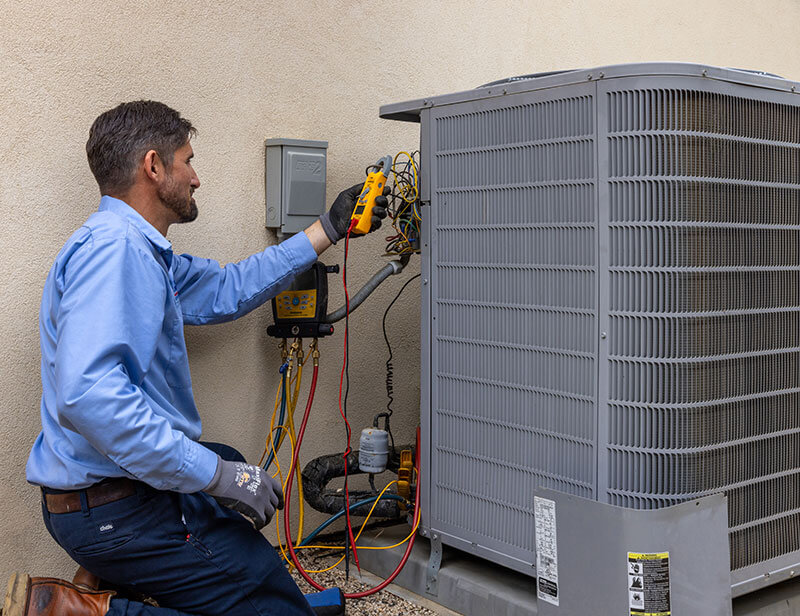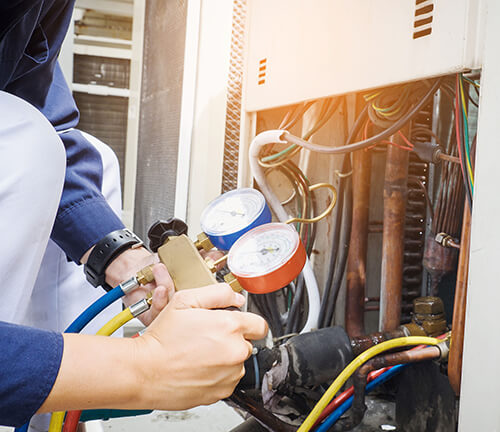Keep Your Home Comfortable Year-Round with DMAKS HVAC Solutions.
Keep Your Home Comfortable Year-Round with DMAKS HVAC Solutions.
Blog Article
Energy-Efficient A/c Solutions to Reduce Energy Bills
As power costs proceed to rise, the relevance of energy-efficient heating and cooling systems ends up being significantly evident. These systems not just promise substantial cost savings on energy costs yet additionally contribute to a more lasting future by decreasing energy usage. With different choices readily available, including geothermal warmth pumps and ductless mini-splits, homeowner face a plethora of selections that can improve convenience and air top quality. Understanding the vital functions and maintenance requirements is vital to maximizing these benefits. What variables should be focused on when picking the appropriate system for your demands?
Advantages of Energy-Efficient Cooling And Heating Equipments
Energy-efficient Heating and cooling systems provide many benefits that prolong past simple price financial savings. By eating much less energy, these systems contribute to lower greenhouse gas discharges, assisting to battle environment modification and promote sustainability.
Additionally, energy-efficient heating and cooling systems frequently offer enhanced convenience levels. Most of these systems include advanced modern technology that enables better temperature level control and boosted air quality (DMAKS HVAC). This brings about a much healthier interior setting, which is particularly important for people with allergies or breathing issues
Furthermore, spending in energy-efficient cooling and heating systems can boost home worth. As even more customers focus on power effectiveness, homes and structures outfitted with these systems may attract higher quotes in the actual estate market.
Kinds Of Energy-Efficient HVAC Options
How can home owners and companies choose the most appropriate energy-efficient HVAC alternatives for their demands? The market supplies a selection of energy-efficient a/c systems, each made to improve comfort while lessening energy usage.
One option is the variable refrigerant flow (VRF) system, which efficiently regulates the temperature in multiple areas within a structure. This system adjusts its refrigerant flow to match the preferred temperature, bring about significant energy cost savings.
An additional popular option is geothermal heatpump, which utilize the earth's stable temperature to heat and cool spaces. By transferring warm to and from the ground, these systems show outstanding efficiency, especially in moderate climates.
In addition, ductless mini-split systems give an energy-efficient choice for homes doing not have ductwork. These systems allow for zone-specific heating and air conditioning, lowering energy waste in vacant areas.
Last but not least, high-efficiency heaters and a/c, with sophisticated SEER and AFUE rankings, provide trustworthy climate control while eating much less power than traditional models. By reviewing these choices, property owners and businesses can pick an a/c system customized to their certain needs and power effectiveness objectives.
Secret Functions to Take Into Consideration

Next, check out the kind of compressor made use of in the system. DMAKS HVAC. Variable-speed compressors can readjust their recommended you read outcome to match the home heating or cooling down demand, bring about enhanced comfort and power financial savings compared to single-speed versions. Furthermore, seek systems equipped with smart thermostats that provide programmable settings and remote access, permitting much better control over power consumption
Another critical feature is the system's air filtering capability. High-efficiency filters can enhance indoor air quality and lower power usage by guaranteeing the system runs efficiently. Moreover, consider the kind of refrigerant used; contemporary systems often utilize eco-friendly refrigerants that have a reduced ecological influence.
Last but not least, ensure that the system works with zoning technology, which permits tailored temperature control in different areas of your home, boosting comfort while reducing power usage.
Tips for Choosing the Right System


Next, think about energy performance rankings, specifically the Seasonal Energy Effectiveness Ratio (SEER) for cooling systems and the Annual Gas Usage Performance (AFUE) for furnace. Higher scores indicate greater performance, which can bring about considerable savings on energy bills in time.
Furthermore, evaluate the type of HVAC system that ideal suits your lifestyle and budget plan. Options include air conditioning, ductless mini-splits, and heatpump, each with its own collection of benefits and drawbacks.
Don't neglect the value of proper installation and sizing; an improperly sized system can cause ineffectiveness and boosted wear. Seek advice from with a professional Heating and cooling professional to get skilled recommendations tailored to your home's pop over to this site distinct demands. This extensive approach will certainly ensure that you pick an energy-efficient heating and cooling system that meets your requirements and spending plan properly.
Maintenance for Optimum Efficiency
Once the best cooling and heating system is in place, ongoing upkeep comes to be vital to guaranteeing optimal effectiveness and longevity. A well-maintained system runs better, resulting in reduced power intake and decreased utility bills. Routine assessments and tune-ups need to be scheduled at least two times a year-- when prior to the air conditioning period and as soon as prior to the heating period.

Property owners must likewise be vigilant concerning checking their a/c system's efficiency. Uncommon noises, rising and fall temperatures, or raised energy bills can suggest underlying concerns that call for immediate focus. By addressing these worries immediately, homeowners can stop expensive repair work and extend the life expectancy of their systems.
Purchasing Website a maintenance plan with a certified service technician not just boosts efficiency however also offers satisfaction, recognizing that the system is running at its best. DMAKS HVAC. Routine maintenance is as a result important for sustaining energy effectiveness and minimizing general functional prices
Final Thought
In final thought, energy-efficient a/c systems provide a sensible solution for reducing utility expenses while boosting comfort and air high quality. By including sophisticated technologies and options such as geothermal heatpump and ductless mini-splits, home owners can achieve significant energy cost savings and add to ecological sustainability. Careful factor to consider of system attributes and ongoing maintenance even more guarantees optimum efficiency, making energy-efficient systems a sensible financial investment for both financial and environmental advantages.
Report this page